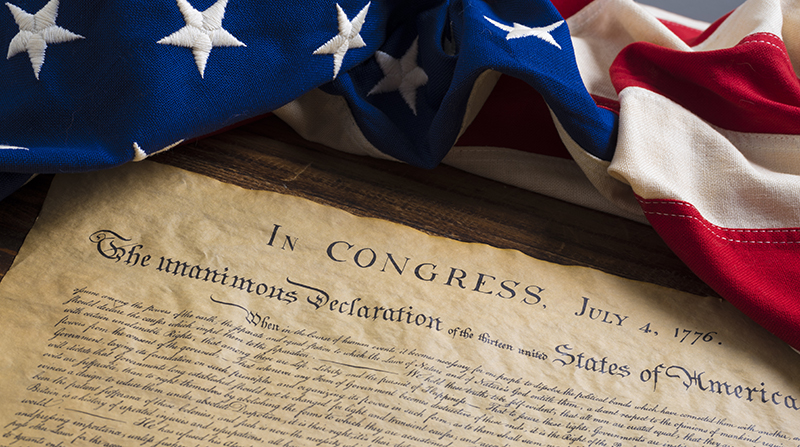
The Founders’ principles will disappear if they are not taught
“We hold these truths to be self-evident: That all men are created equal; that they are endowed by their Creator with certain unalienable rights; that among these are life, liberty, and the pursuit of happiness.”
These are among the most famous words from the Declaration of Independence, a document drafted 241 years ago in the ultimate gambit which secured America’s sovereignty. We gather together on the Fourth of July to celebrate not only this act of independence, but the values on which this country was founded. As we reflect on our American heritage this Independence Day, let us also look to the future. Where is America going? Will America remain the bastion of freedom? Are we becoming more free or are we gradually losing our freedom?
The Fund for American Studies (TFAS), is committed to the study of these questions. To commemorate our 50th anniversary, TFAS commissioned a Freedom Index survey to engage in a national discussion on the importance of freedom and to determine how our country defines freedom. What we found was a mixture of encouraging news and troubling warnings.
According to the survey, nearly 40 percent of Americans believe the country has become less free in the past 10 years. Forty percent of Americans believe that in a decade there has been a noticeable degradation of their liberties whether they be individual freedoms or civil and political rights. Even more disappointing, polling results showed that more than 63 percent of Americans support economic policies and government regulations that weaken our freedoms. Even Republicans and conservatives, who traditionally embrace free markets, showed surprising support for government interference with majorities polling in favor of policies that regulate oil and pharmaceutical pricing and support tariffs on foreign goods.
Not only do Americans feel less free, they also possess a deep disconnect between a general American nostalgia and love for freedom and the policies and ideas that actually allow a free society to flourish. It’s not difficult to see why.
In our current political milieu, populism on both sides of the aisle seems to dominate any coverage of current events. At times, it seems that critical thinking and nuanced opinions have worn out their welcome and have been unseated by dogmatic and emotional arguments that offer no solutions and leave us further divided than before. This often hysterical discourse is a threat to many of the freedoms that we take for granted, be they our First Amendment rights or the fundamental basis from which we derive economic freedom and individualism.
Take the common-place discussion of possible “limitations” of free speech, especially those on college campuses. This threat to our First Amendment rights can have lasting repercussions, since college students are getting the wrong message from college faculty and administrators who lack the courage to defend intellectual discourse. The First Amendment was designed to protect all forms of expression, including offensive speech and unpopular opinion. The very debate over free speech often ignores the original motivation from which the right was predicated – it was a response to the violations of King George III.
We celebrate the Fourth of July to pay tribute to the Founding Fathers who sacrificed their lives and fortunes to establish a free Republic. The Declaration of Independence lists the reasons why the Founding Fathers broke away from Britain. They name King George III’s repeated “injuries and usurpations,” all examples of continuous political meddling and economic disruptions. The Declaration was, in fact, long overdue. The Boston Tea Party, which took place three years prior to the signing, to protest the Tea Act, proved that American resistance to stifling regulations was at a boiling point.
The Declaration accuses George III having “erected a multitude of new offices, and sent hither swarms of officers to harass our people and eat out their substance.” This sounds very much like a charge that could be leveled at Washington, D.C. today. More and more, we are seeing the reach of government expand into every aspect of business and into the lives of citizens. The power of the administrative state has grown unchecked by the legislative, executive and judicial branches.
It’s clear that we must work to keep this great experiment in liberty alive by teaching America’s founding principles to the rising generation. In order for our free society to survive, our future leaders must not forget the ideas of our Founding Fathers and the great sacrifices and risks made by the heroes of the American Revolution. I hope that the trend we found in our Freedom Index reverses – that in 10 years no American feels as if their nation is less free than it was before. But that is only possible if we commit ourselves to teaching the future generation of leaders about our founding principles and the greatness that once was and is America.
The article originally appeared in The Washington Times.

